https://github.com/redox-os/orbtk
The Rust UI-Toolkit.
https://github.com/redox-os/orbtk
cross-platform entity-component gui redox-os rust rust-lang widgets
Last synced: 10 months ago
JSON representation
The Rust UI-Toolkit.
- Host: GitHub
- URL: https://github.com/redox-os/orbtk
- Owner: redox-os
- License: mit
- Created: 2015-12-14T19:17:13.000Z (about 10 years ago)
- Default Branch: develop
- Last Pushed: 2022-10-18T07:27:31.000Z (over 3 years ago)
- Last Synced: 2025-04-28T17:05:04.983Z (10 months ago)
- Topics: cross-platform, entity-component, gui, redox-os, rust, rust-lang, widgets
- Language: Rust
- Homepage:
- Size: 16.3 MB
- Stars: 3,789
- Watchers: 75
- Forks: 187
- Open Issues: 88
-
Metadata Files:
- Readme: README.md
- Changelog: CHANGELOG.md
- License: LICENSE
Awesome Lists containing this project
- awesome-open-synth - orbtk - os](https://github.com/redox-os) | | Rust | (Rust)
- awesome-rust - OrbTk - os/orbtk/workflows/build/badge.svg?branch=develop)](https://github.com/redox-os/orbtk/actions) (Libraries / GUI)
- awesome-rust-cn - OrbTk
- fucking-awesome-rust - OrbTk - The Orbital Widget Toolkit is a multi platform (G)UI toolkit using SDL2 [](https://github.com/redox-os/orbtk/actions) (Libraries / GUI)
- awesome-rust - OrbTk - The Orbital Widget Toolkit is a multi platform (G)UI toolkit using SDL2 [](https://github.com/redox-os/orbtk/actions) (Libraries / GUI)
- awesome-list - orbtk - Toolkit. | redox-os | 3248 | (Rust)
- awesome-rust-with-stars - OrbTk - 10-13 | (Libraries / GUI)
README
## OrbTk is Sunsetting
It is with great sadness that I announce that OrbTk is sunsetting. In the many years since I first made OrbTk, the Rust GUI ecosystem has grown at an amazing rate. Toolkits with more features have developed, and which are more actively maintained. I first created this project to bootstrap UI development on Redox OS. Many of the applications on Redox use OrbTk. [@FloVanGH](https://github.com/FloVanGH) stepped in to do large refactoring between the 0.2 and 0.3 release, which modernized the OrbTk API. [@rzerres](https://github.com/rzerres) stepped in to add many features and maintain OrbTk since the 0.3 release.
I have since moved on to working with [iced](https://iced.rs/). [@FloVanGH](https://github.com/FloVanGH) has taken a job working on [slint](https://slint-ui.com/). And [@rzerres](https://github.com/rzerres) has expressed interest in using [slint](https://slint-ui.com/) for their projects. Both [iced](https://iced.rs/) and [slint](https://slint-ui.com/) provide renderer agnostic toolkits that will be compatible with Redox OS, but they also support more features than OrbTk. So, I have decided, with agreement from [@rzerres](https://github.com/rzerres), that OrbTk is to stop being actively maintained, in favor of these other Rust native toolkits.
-- [Jeremy Soller](https://github.com/jackpot51/)
## Original README
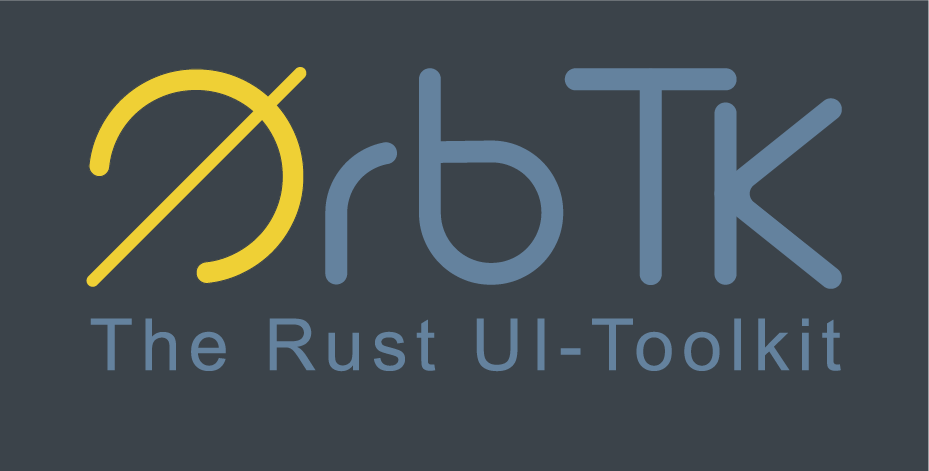
[](https://github.com/redox-os/orbtk/actions)
[](./LICENSE)
[](https://crates.io/crates/orbtk/0.3.1-alpha4)
[](https://docs.rs/crate/orbtk/0.3.1-alpha4)
The Orbital Widget Toolkit is a cross-platform (G)UI toolkit for building scalable user interfaces with the programming language Rust. It's based
on the [Entity Component System Pattern](https://en.wikipedia.org/wiki/Entity_component_system) and provides a [functional Reactive](https://en.wikipedia.org/wiki/Functional_reactive_programming)-like API.
The main goals of OrbTk are speed, ease of use, and cross-platform compatibility.
## Screenshots
The next images are taken from example applications, that have been compiled for MacOS / OS-X.
* The `showcase` example
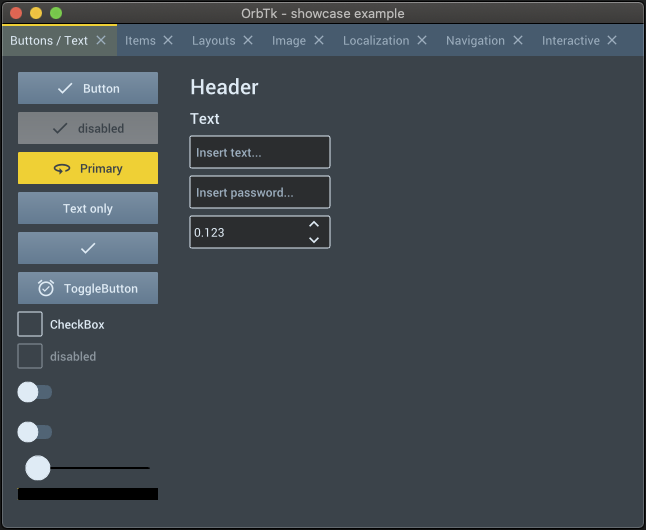
* Themed `calculator` examples
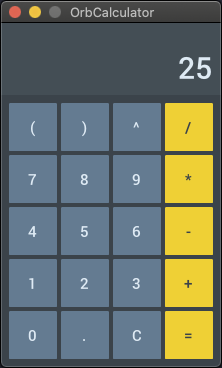
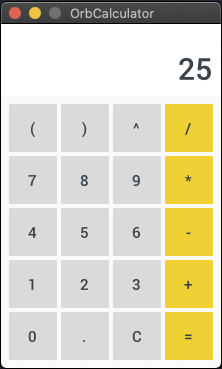
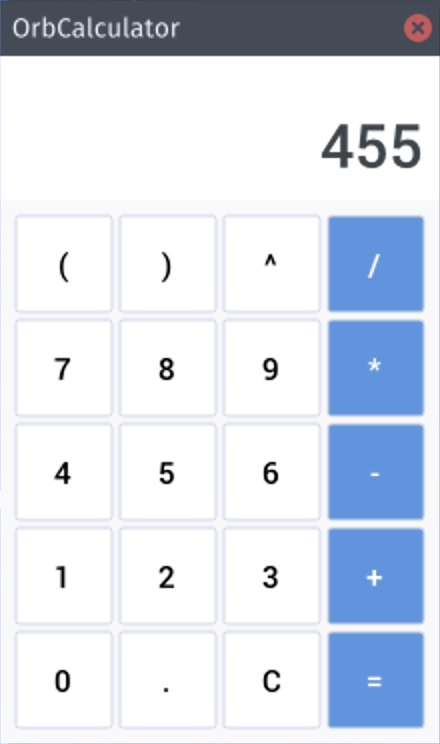
Other screenshots have been rendered from [examples code](https://github.com/redox-os/orbtk/blob/develop/orbtk/examples/README.md), that is stored
inside the `orbtk` crate.
## Features:
* Modern lightweight API
* Cross platform
* Modular crates
* Based on Entity Component System library [DCES](https://gitlab.redox-os.org/redox-os/dces-rust)
* Flexible event system
* Integrated widget library
* Custom widgets
* Custom theming engine
* Dynamic theme switching
* Integrated debugging tools
* Localization
## Platforms
* Redox OS
* Linux
* macOS
* Windows
* openBSD (not tested, but should work)
* Web (broken, will be fixed soon)
* Android (wip, will be released soon)
* iOS (wip, will be released soon)
* Ubuntu Touch (on hold)
## Planned features
* Conformable use of async
* More default widgets
* Book
* Animations
* Split application in modules
* 3D context
* More integrated debugging tools
## Documentation
### Build and open documentation
You can build and view the latest documentation by executing the following command:
```text
cargo doc --no-deps --open
```
### OrbTk book
The OrbTk book is written from a developers perspective. It aims to
introduce the basic concept, beside a bird's eye view of the toolkit
structure. An in depth discussion of the provided crates is followed
by example listings. This section collects example code with annotated
blocks. The annotations are targeting best practice usage of available
widgets, their interaction with other modules coupled with a
descriptive text where reasonable.
A precompiled version is available for [online](https://github.com/redox-os/orbtk-book/wiki) reading.
You are invited to checkout its repository at [OrbTk book](https://github.com/redox-os/orbtk-book).
Please do **not** expect at finalized version. It is not complete at
all. The given statis is `marked as work in progress` (WIP). Any help to
improve the chapters and/or translations are quite welcome.
## Usage
To include OrbTk as an external dependency into your project, add this
line to its `Cargo.toml` file:
```text
...
[dependencies]
...
orbtk = "0.3.1-alpha4"
...
```
To use the latest development version of OrbTk as an external
dependency, add this line into its `Cargo.toml` file:
```text
...
[dependencies]
...
orbtk = { git = "https://github.com/redox-os/orbtk.git", branch = "develop" }
...
```
You can also check out the OrbTk template project to start a new
project: https://github.com/redox-os/orbtk-template
## Minimal Example
```rust
use orbtk::prelude::*;
fn main() {
Application::new()
.window(|ctx| {
Window::new()
.title("OrbTk - minimal example")
.position((100.0, 100.0))
.size(420.0, 730.0)
.child(TextBlock::new().text("OrbTk").build(ctx))
.build(ctx)
})
.run();
}
```
## Base concepts
### Widget
Widgets are the building blocks of user interfaces in OrbTk. They are
things like Buttons, TextBoxes, ListViews, Views (Screens) and
Grid(Layout)s. Each widget implements the [Widget
trait](https://github.com/redox-os/orbtk/blob/develop/orbtk_core/src/widget_base/mod.rs)
and is generated by the [widget!
macro](https://github.com/redox-os/orbtk/blob/develop/orbtk_core/src/macros.rs). A
widget consists of a name like `Button` and a list of its properties
like `text: String`, `background: Brush` or `count: u32`. After the
`build` method of a widget is called it's added to the Entity
Component System where it exists as an `Entity` (index) with
`Components`. The struct of a widget serves as a builder using the
[builder
pattern](https://doc.rust-lang.org/1.0.0/style/ownership/builders.html).
Basic usage of the widget! macro:
```rust
widget!(
MyWidget {
background: Brush,
count: u32,
text: String,
...
}
);
```
### Widget Templates
Each widget has to implement the [Template
trait](https://github.com/redox-os/orbtk/blob/develop/orbtk_core/src/widget_base/template.rs).
The template defines the structure and the default values that the
widget will store in its properties. For example: You can define your
hand-crafted `Button` widget (lets call it `MyButton`). `MyButton` is
represented as a tree of three child widgets: A top level
`Container` widget that will hand over to its child, the `StackPanel`
widget, which in turn will hand over to its child, the `TextBlock`
widget.
The next code snippet prints out the source code of this basic Template trait:
```rust
impl Template for MyButton {
fn template(self, id: Entity, ctx: &mut BuildContext) -> Self {
self.name("MyButton")
.style("my_button_style")
.background("#000000")
.count(0)
.text("Initial text")
.child(Container::new()
// Container references the same background as MyButton
.background(id)
.child(TextBlock::new()
// TextBlock references the same text as MyButton
.text(id)
.build(ctx)
)
.build(ctx)
)
}
}
```
### Widget State
Any changes that are triggered via user interaction or via events are
handled inside the state of a widget. If generated, they are processed
to manipulate the inner state. Each state must implement the [State
trait](https://github.com/redox-os/orbtk/blob/develop/orbtk_core/src/widget_base/state.rs).
The inner state of a widget is represented by the current values of
its properties.
Have a look at this code snippet to make up a state trait:
```rust
#[derive(Default, AsAny)]
struct MyState {
...
}
impl State for MyState {
fn update(&mut self, _: &mut Registry, ctx: &mut Context) {
// update the widget
...
}
}
widget!(
// Add MyState as state of MyWidget
MyWidget {
...
}
);
```
The update method requires a [`Context`
parameter](https://github.com/redox-os/orbtk/blob/develop/orbtk_core/src/widget_base/context.rs).
This structure provides access to the state's widget itself (the `entity`)
and its components (the `properties`). It also provides methods (the `associated functions`) to access
the children of the widget, this it is able to manipulate the widget tree.
### Styling widgets and define themes
OrbTk provides a `theme engine` base on
[RON](https://github.com/ron-rs/ron). The engine provides the
following features:
* Split theme in different files
* Reference resources values in the theme files (colors, font stuff)
* Derive styles
* Dynamic theme switching
* State styling (pressed | selected | focused | disabled)
Have a look at this short style definition:
```ron
Theme (
styles: {
"base": (
properties: {
"font_size": "$FONT_SIZE_12",
"font_family": "$MEDIUM_FONT",
}
),
"button": (
base: "base",
properties: {
"background": "$BLACK",
},
states: [
(
key: "pressed",
properties: {
"background": "$WHITE",
}
)
]
)
},
resource: {
"BLACK": "#000000",
"WHITE": "#ffffff",
"MEDIUM_FONT": "Roboto-Medium",
"FONT_SIZE_12": 12,
"FONT_SIZE_16": 16,
}
)
```
But you are not requested to reference a theme engine. OrbTk
enables as well the declaraton of property values inside the source
code (`inlined theming`).
### Localization
OrbTk supports the functionality to register an application wide
localization service. A localization service has to implement the
[Localization](https://github.com/redox-os/orbtk/blob/develop/orbtk_core/src/localization/mod.rs)
trait.
*Example*
```rust
pub struct MyLocalization {
...
}
impl Localization for MyLocalization {
/// Gets the current language by language key e.g. `en_US` or `de_DE`.
fn language(&self) -> &String {
...
}
/// Sets the current language by key e.g. `en_US` or `de_DE`.
fn set_language(&mut self, key: &str) {
...
}
/// Gets the translated text for the given key. If there is no given translation the `key` will be returned as result.
fn text(&self, key: String) -> String {
...
}
}
```
It is possible to register a localization service for an
application. Simply make use of the
[RonLocalization](https://github.com/redox-os/orbtk/blob/develop/orbtk_core/src/localization/ron_localization/mod.rs),
that can read localization dictionaries coded in the
[RON](https://github.com/ron-rs/ron) format.
*Example*
```rust
let de_de = r#"
Dictionary(
words: {
"hello": "Hallo",
"world": "Welt",
}
)
"#;
Application::new()
.localization(
RonLocalization::create()
// sets the initial language
.language("en_US")
// adds an language dictionary to the localization service.
.dictionary("de_DE", de_de)
.build()
)
.window(|ctx| {
Window::new()
.title("OrbTk - showcase example")
.position((100, 100))
.size(600, 730)
.resizable(true)
.child(TextBlock::new().text("hello").build(ctx))
.build(ctx)
})
.run();
```
Inside this example code the `text` property (value **hello**) is used
as the `key`. This key is matched to the correponding `value` inside the
dictionary of the corresponding localization service. If you haven't defined a
dictionary for the current language, OrbTk will simply take the value of the property itself.
You are free to start development without and any localization, but add it afterwards.
You may switch the language at runtime. Inside the state widget you simply consume the `set_language` method, that is accessible via the
[Context](https://github.com/redox-os/orbtk/blob/develop/orbtk_core/src/widget_base/context.rs)
structure.
## Run Examples
### Build with sdl2 installation
If your target Operating-System is `Linux`, `macOS` or `Windows`, a
`sdl2` installation is required. Please check the documentation that
is provieded for th [`rust-sdk2` crate](
https://github.com/Rust-SDL2/rust-sdl2).
### Build with sdl2 from source
As an alternative, you may build `OrbTk` while bundling `sdl2`. To activate the `bundled` feature go ahead like this:
```shell
cargo run --example showcase --features bundled
```
Please asure, that you `toolchain` will provide a *working* C compiler (e.g. `gcc`, `clang`, or MS's compiler).
To target `linux`, you also need to provide `cmake`:
```shell
sudo apt install cmake
```
If you have trouble build the provided OrbTk examples or simply don't want to
use a C compiler, please check the backend section. It contains
alternatives.
All example source-code resides inside the [`examples` subdirectory](./orbtk/examples) of the orbtk subcrate.
Compile, start and play around with the `showcase` example while executing the following command:
```text
cargo run --example showcase --release
```
OrbTk has an integrated `debug` tools. It will oultline the bounds of
all managed widgets inside the widget tree. This will include
invisible ones. You may also want to print out the tree structure of your app.
This is activated, via feature flags like this:
```text
cargo run --example showcase --release --features "debug, log"
```
## Run Examples with cargo-node
To run the examples as a browser, electron or cordova app you have to install cargo-node:
```text
cargo install -f cargo-node
```
`cargo-node` itself relies on `npm` version 6.9.0, which is included with `Node.js` version 10.16.3. You can download it
from its [homepage](https://nodejs.org/dist/v10.16.3/).
Rust's `cargo` is also required. All cargo-node's dependencies are installed automatically.
### Start examples
To start the `showcase` example as a node binary, executing one of the following commands:
* Run as browser app:
```text
cargo node run --target browser --example showcase
```
* Run as electron app:
```text
cargo node run --target electron --example showcase
```
* Run as cordova app on android:
```text
cargo node run --target android --example showcase
```
## crates structure
* orbtk: sub-crate, that provides all needed components to build an OrbTk `cross platform UI`.
* orbtk_core: sub-crate, that provides the `core components` of Orbtk (widget basics, tree handling, theming)
* orbtk_orbclient: sub-crate, that handles cross platform aware `window and event management`. It is based on **OrbClient**.
* orbtk_tinyskia: Wrapper methods that consumes the **tiny-skia** `2D rendering engine`.
* orbtk_widgets: sub-crate providing the standard OrbTk `widget library` and and `theming support`.
## Inspirations
* [Flutter](https://flutter.io/)
* [React](https://reactjs.org/)
* [Yew](https://github.com/DenisKolodin/yew)
## Showcases
* [Plural Planner](https://codeberg.org/flovanco/Plural): Task app
* [Space Editor](https://codeberg.org/flovanco/space-editor): 2D Tile Map Editor compatible with OrbGame
* [twin-commander](https://github.com/kivimango/twin-commander): A twin-panel file manager specifically for the Redox OS
## Contribution
If you want to help and improve OrbTk submit your feedback via the
[issue tracker](https://github.com/redox-os/orbtk/issues). All pull
requests are welcome and will be reviewed. You can also discuss with
other OrbTk developers via the [Redox chat
interface](https://redox-os.org/community/). Please join the **orbtk**
channel.
#### Contribution check list
* Please document for all your `pub` structs, traits and functions.
* Please add suitable tests methods.
* Use static &str for widget ids and new style definitions.
* For widget development check ProgressBar or Slider as an example.
* Add your changes inside CHANGELOG.md
* Extend the example section to show consumption of your code.
* Always run `cargo fmt` before uploading.
* Please run `cargo cippy` before uploading.
* Create the PR using our template.
## License
[Logo-CC_BY]: https://i.creativecommons.org/l/by/4.0/88x31.png "Creative Common Logo"
[License-CC_BY]: https://creativecommons.org/licenses/by/4.0/legalcode "Creative Common License"
Source-Code is licensed under MIT license ([LICENSE](LICENSE)).
© 2017-2022 Jeremy Soller
© 2018-2022 Florian Blasius
This documentation work is licensed under a [Creative Common License 4.0][License-CC_BY]
![Creative Common Logo][Logo-CC_BY]
© 2020-2022 Ralf Zerres